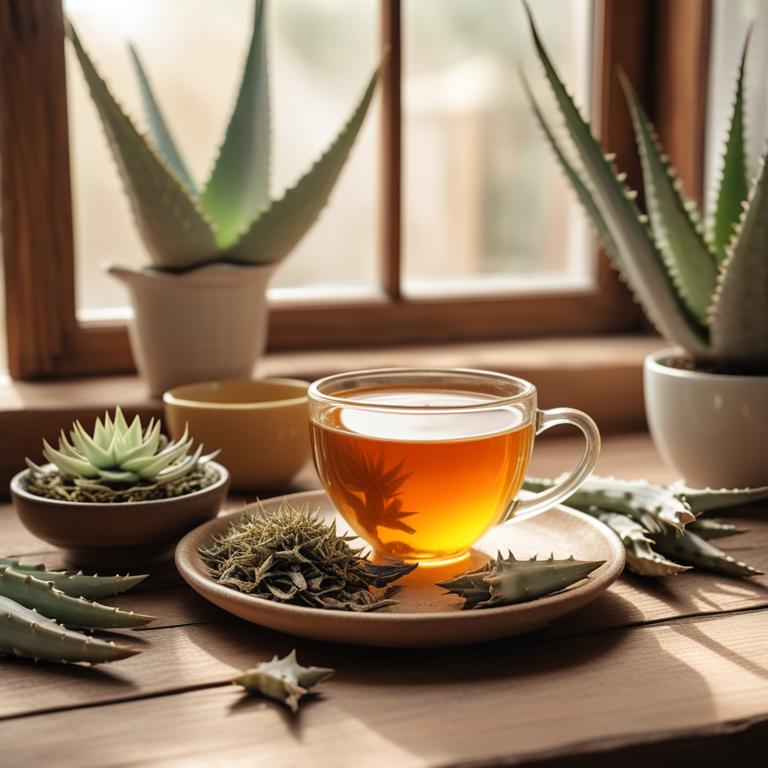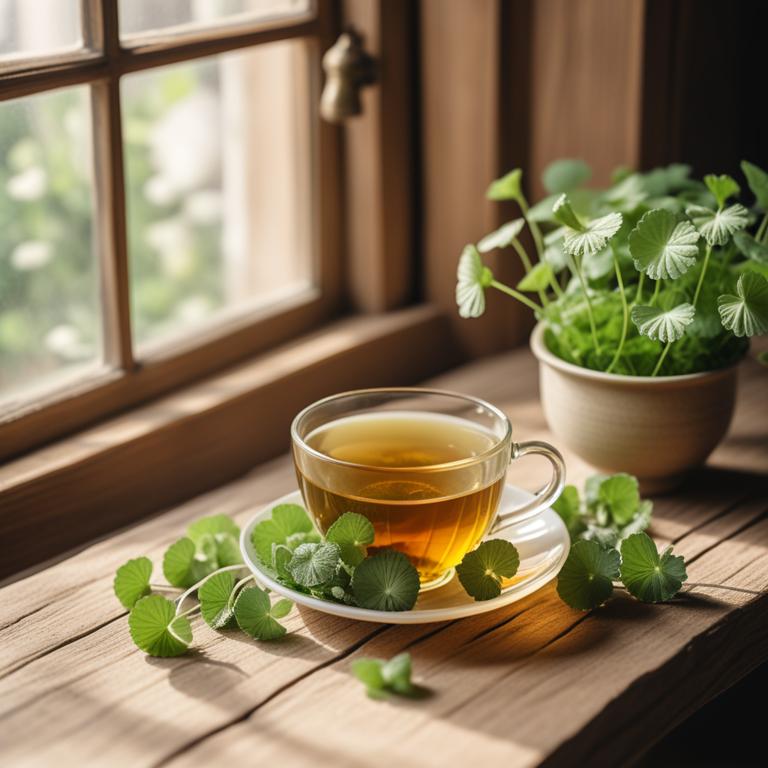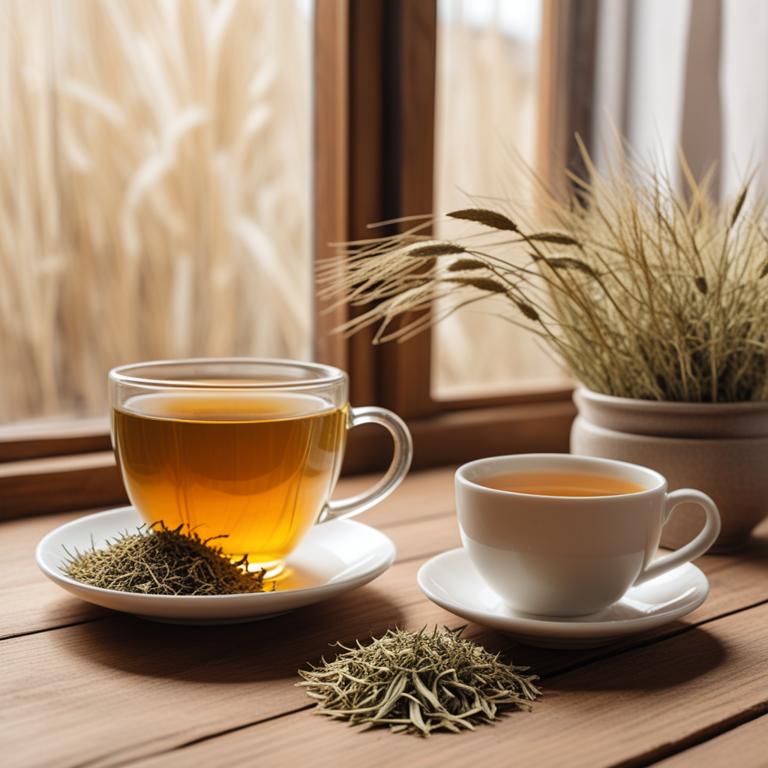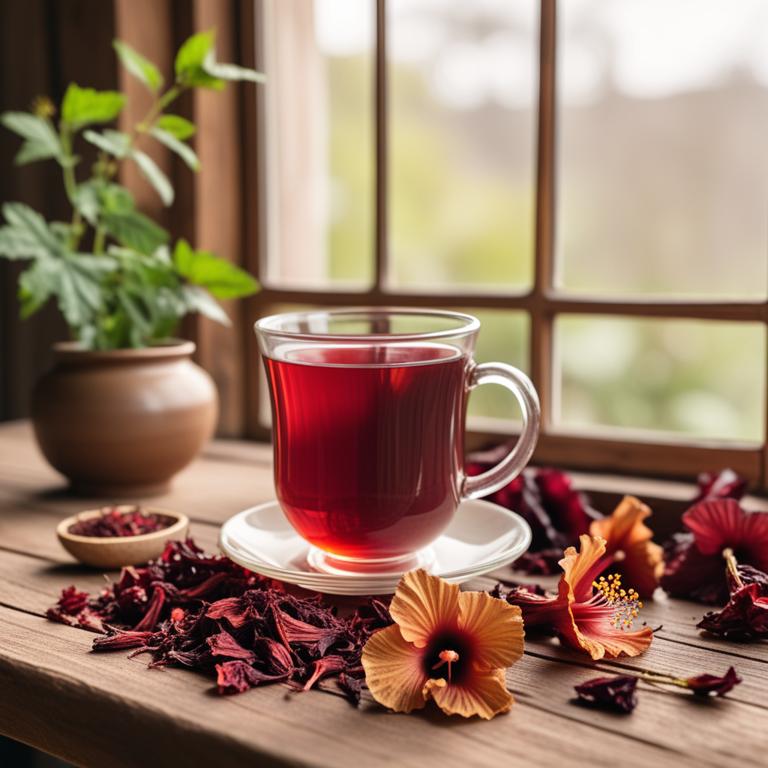9 Best Herbal Teas For Oily Face

Herbal teas for oily face are a natural and effective remedy to help control and balance the sebum production on the skin, thereby reducing the appearance of acne, blackheads, and other oily skin issues.
These teas work by regulating the body's hormonal balance, reducing inflammation, and soothing the skin, making them an ideal solution for individuals struggling with oily skin.
Some of the most effective herbal teas for oily face include peppermint tea, which cools and calms the skin, chamomile tea, which reduces inflammation and promotes relaxation, and green tea, which is rich in antioxidants and helps to balance the skin's pH levels.
Additionally, other herbal teas such as licorice root tea, calendula tea, and dandelion tea also have anti-inflammatory and astringent properties, making them beneficial in reducing the appearance of oily skin.
According to the American journal of clinical dermatology, teas for oily face may be beneficial due to the antioxidant properties of green and black tea, which can protect the skin from UV-induced damage and early aging.
Below there's a list of the 9 best herbal teas for oily face.
- 1. Aloe barbadensis teas
- 2. Centella asiatica teas
- 3. Lavandula angustifolia teas
- 4. Mentha x piperita teas
- 5. Avena sativa teas
- 6. Calendula officinalis teas
- 7. Cymbopogon citratus teas
- 8. Glycyrrhiza glabra teas
- 9. Hibiscus sabdariffa teas
Also you may be interested in...
TODAY'S FREE BOUNDLE
Herb Drying Checklist + Herbal Tea Shopping List + Medicinal Herbs Flashcards
Enter you best email address below to receive this bundle (3 product valued $19.95) for FREE + exclusive access to The Aphotecary Letter.
$19.95 -> $0.00
1. Aloe barbadensis teas

Aloe barbadensis teas have been increasingly used to treat oily face ailments, thanks to their soothing and purifying properties.
The anti-inflammatory and astringent properties present in Aloe barbadensis teas help to reduce the oiliness of the skin, while also controlling the growth of bacteria that can cause acne.
The bioactive constituents of Aloe barbadensis teas, such as aloin, aloe-emodin, and acemannan, have been found to have antimicrobial and antioxidant effects, which help to regulate the skin's oil production and prevent clogged pores.
Regular consumption of Aloe barbadensis teas has been found to be beneficial in treating oily face ailments by balancing the skin's pH, reducing inflammation, and promoting a healthy skin tone.
2. Centella asiatica teas

Centella asiatica teas have been traditionally used to treat oily face ailments due to their anti-inflammatory and astringent properties.
These herbal preparations help to treat oily skin by reducing sebum production, tightening pores, and regulating the skin's natural moisture balance.
The bioactive constituents, including asiatic acid, madecassic acid, and saponins, in Centella asiatica teas have been shown to possess antioxidant and anti-inflammatory activities that contribute to their therapeutic effects.
Regular consumption of Centella asiatica teas may help to regulate the skin's oil production, reduce acne and other skin problems, and promote a healthier and more balanced complexion.
3. Lavandula angustifolia teas

Lavandula angustifolia teas have been used for centuries to treat oily face ailments due to their antiseptic and anti-inflammatory properties.
The bioactive constituents of this herbal preparation, including linalool and linalyl acetate, help to regulate sebum production, reduce acne, and prevent bacterial growth on the skin.
These properties assist in balancing the skin's natural pH, reducing the appearance of pores, and promoting a healthy complexion.
By incorporating Lavandula angustifolia teas into a skincare routine, individuals can experience benefits such as reduced oil production, fewer breakouts, and a smoother, more radiant complexion.
4. Mentha x piperita teas

Mentha x piperita teas, also known as peppermint tea, have been traditionally used to treat oily face ailments due to their astringent, antiseptic, and anti-inflammatory properties.
The tea's ability to help regulate oil production and reduce inflammation helps to alleviate the symptoms of oily skin, such as acne and blackheads.
The bioactive constituents of peppermint tea, including menthol, menthone, and limonene, contribute to its therapeutic effects by reducing sebum production, killing bacteria, and soothing irritated skin.
Regular consumption of peppermint tea has been found to provide benefits in treating oily face ailments, including reduced acne severity, improved skin tone, and a more balanced complexion.
Related Study
According to "Current topics in medicinal chemistry", Mentha x piperita teas for oily face may not be directly related to the study on dandruff treatment, but it can be inferred that Mentha x piperita, which is peppermint, could be beneficial for oily face due to its properties as an alternative therapy that disrupts microbial growth, similar to its application in dandruff treatment, but more research is needed to confirm its efficacy in humans for this specific use.
5. Avena sativa teas

Avena sativa teas, derived from the oat plant, have been traditionally used to treat oily facial skin issues due to their soothing and anti-inflammatory properties.
The herbal preparation helps to treat this ailment by regulating sebum production, reducing inflammation, and calming irritated skin.
The bioactive constituents of Avena sativa teas, including avenanthramides and beta-glucans, have been found to possess antioxidant and anti-inflammatory properties that aid in reducing acne and oiliness of the skin.
The benefits of using Avena sativa teas to treat oily facial skin issues include improved skin clarity, reduced inflammation, and a balanced sebum production, leading to healthier and more radiant-looking skin.
6. Calendula officinalis teas

Calendula officinalis teas have been used as a natural remedy to treat oily face ailments due to their anti-inflammatory, antiseptic, and astringent properties.
The bioactive constituents of calendula, including triterpenoid saponins and carotenoids, help to reduce sebum production, prevent bacterial growth, and soothe irritated skin.
By reducing inflammation and preventing clogged pores, calendula teas can help to minimize the appearance of oily skin and prevent breakouts.
Regular consumption of calendula teas may also promote a balanced skin pH and reduce the production of excess sebum, leading to a healthier and more even skin tone.
7. Cymbopogon citratus teas

Cymbopogon citratus teas, also known as lemongrass tea, have been traditionally used to treat oily face ailments due to their astringent and antiseptic properties.
The herbal preparation helps to treat oily face by reducing sebum production and balancing the skin's pH levels, resulting in a clearer and more even-toned complexion.
The bioactive constituents of Cymbopogon citratus teas, including citral and geraniol, have been shown to exhibit anti-inflammatory and antimicrobial properties that help to combat acne and other skin issues associated with oily faces.
Regular consumption of Cymbopogon citratus teas has been found to provide numerous benefits in treating oily face ailments, including reduced oil production, improved skin texture, and a more radiant and healthy-looking complexion.
8. Glycyrrhiza glabra teas

Glycyrrhiza glabra teas have been traditionally used to treat oily face ailments due to their anti-inflammatory and astringent properties, which help to reduce the production of sebum and tighten the pores.
The herbal preparation's ability to balance the skin's pH level and regulate the sebaceous glands also contributes to its effectiveness in treating oily skin.
Glycyrrhiza glabra teas contain bioactive constituents such as glycyrrhizin, which has antiseptic and anti-inflammatory properties that help to soothe and calm the skin, reducing redness and inflammation associated with oily skin.
Regular consumption of Glycyrrhiza glabra teas can lead to a reduction in oil production, a decrease in acne, and an improvement in overall skin clarity and tone.
9. Hibiscus sabdariffa teas

Hibiscus sabdariffa teas have been traditionally used to treat oily face ailments due to their astringent, antiseptic, and antifungal properties.
The anthocyanins and flavonoids present in these teas help to reduce sebum production, thereby controlling oiliness on the skin.
The bioactive constituents, such as ascorbic acid and polyphenols, aid in the reduction of inflammation and the prevention of bacterial growth, further contributing to the treatment of oily skin.
Regular consumption of Hibiscus sabdariffa teas has been found to provide numerous benefits, including improved skin texture, reduced pores, and a more balanced skin pH, ultimately leading to a clearer and healthier complexion.